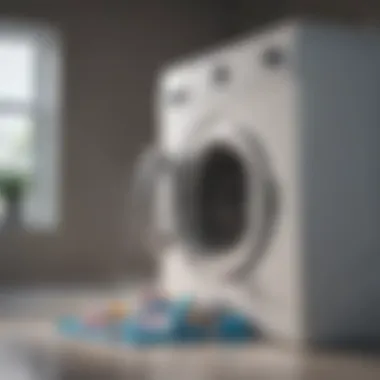Using Dishwasher Tablets in Washing Machines: Pros and Cons


Intro
The use of dishwasher tablets in washing machines is an unconventional topic that has recently gained attention among homeowners. As many seek innovative solutions to simplify their cleaning tasks, the thought of leveraging these tablets for laundry care emerges as a captivating proposition. This exploration is not just about convenience; it requires a deeper understanding of their chemical composition and how these properties translate to different cleaning contexts.
Understanding the relationship between dishwashing and laundry detergent unveils key distinctions in their formulation. This article will guide you through the intricacies of using dishwasher tablets in washing machines, revealing both the potential benefits and pitfalls.
Key Insights and Trends
In recent years, there have been noticeable shifts in consumer behavior concerning home care products. Homeowners are increasingly experimenting with various cleaning agents, looking to achieve more efficient results while minimizing costs. Dishwasher tablets are specifically designed to tackle tough cleaning tasks on dishes, utilizing enzymes and surfactants that can be quite effective.
"The trend toward multi-purpose cleaning solutions reflects a broader move toward simplicity and efficiency in household management."
Benefits of Using Dishwasher Tablets
- Cost-Effective: Dishwasher tablets can be cheaper than traditional laundry detergents when used correctly.
- Cleaning Power: The concentrated enzymes in these tablets help remove stains effectively.
- Convenience: They are pre-measured, which reduces the hassle of measuring out the correct amount of detergent.
Potential Drawbacks
- Residue Build-Up: Some tablets may leave residue on clothes, potentially causing irritation.
- Compatibility Issues: Not all washing machines are designed to handle these products, risking damage over time.
- Safety Concerns: There are safety risks to consider, especially in households with small children.
Practical Tips and How-To Guides
If you decide to venture into using dishwasher tablets in your washing machine, it is essential to follow some practical guidelines to ensure safety and effectiveness.
How to Use Dishwasher Tablets in a Washing Machine
- Check Compatibility: Ensure that your washing machine can handle such products.
- Test on Small Load: Use a single tablet on a small load to assess results before making it a routine practice.
- Monitor for Residue: After washing, inspect clothing for any unusual residue or damage.
Alternatives to Consider
- Powdered Laundry Detergents: These often offer a more suitable formulation for fabrics.
- Liquid Detergents: They can provide effective stain removal without the risks associated with dishwasher tablets.
By evaluating the practicality of this method alongside available alternatives, homeowners can make informed decisions about their laundry care. Understanding both the favorable outcomes and the possible risks allows for a more deliberate approach to household cleaning strategies.
Prelude
The unconventional practice of using dishwasher tablets in washing machines has sparked considerable discussion among homeowners. This approach raises questions about its effects on laundry, cleaning efficacy, and potential risks. Choosing the right cleaning products is essential for garment longevity and machine performance.
In this article, we will delve deeply into the topic of dishwasher tablets, outlining their composition and intended purpose. We will explore the differences between dishwashing and laundry products to clarify why this substitution is attractive yet controversial. The growing popularity of cost-effective cleaning methods among consumers makes this exploration even more relevant.
Understanding the implications of using dishwasher tablets in washing machines can empower homeowners. They can make informed choices that consider both benefits and potential drawbacks of such unconventional methods. As we investigate the effectiveness of this cleaning approach, we will examine various expert opinions, safety considerations, and practical alternatives. The insights provided in this article aim to guide readers through this complex subject, which is of increasing interest in today's fast-paced, budget-conscious environment.
By the end of this examination, readers will be equipped with a well-rounded understanding of why this topic matters. They will gain insights that help optimize their laundry experiences with thorough knowledge and careful decision-making.
Understanding Dishwasher Tablets
In the realm of home cleaning products, dishwasher tablets stand out as a popular choice for many households. Their formulation is specifically designed to tackle tough grease and food residues on dishes. However, their potential use in laundry raises important questions about efficacy and safety. By understanding the components and functions of dishwasher tablets, homeowners can make more informed decisions about cleaning methods.
Composition of Dishwasher Tablets
Dishwasher tablets typically consist of several key ingredients aimed at improving cleaning performance. Common components include surfactants, enzymes, and citric acid. Surfactants help to break down fats and oils, allowing for easier cleaning. Enzymes, notably proteases and amylases, assist in breaking down proteins and starches, respectively. Citric acid serves as a natural chelating agent, helping to soften water which improves the product's effectiveness.
Additionally, many commercially available products contain phosphates, which enhance cleaning efficiency but are increasingly scrutinized due to environmental concerns. Understanding these ingredients can clarify how dishwasher tablets might interact differently in a washing machine, where fabrics and water types vary significantly.
Mechanism of Action
The cleaning action of dishwasher tablets unfolds through a multi-step process. First, when the tablet dissolves in water, it releases surfactants which lower the surface tension, allowing them to penetrate greasy residues effectively. The enzymes then become active, targeting specific types of stains based on their composition.


This dual action—mechanical and chemical—makes dishwasher tablets effective in cutting through difficult residues. However, the dynamics of laundry differ, as fabric types and soil levels vary widely compared to dishware. Moreover, unlike dishwashers, washing machines often involve longer wash cycles and protentional higher agitation, which may further influence how these cleaning agents perform across different fabrics.
With this understanding of dishwasher tablets, consumers can assess the implications of using them in laundry settings. It raises questions about potential effectiveness compared to standard laundry detergents and possible impacts on fabrics and washing machines.
Purpose and Intended Use of Dishwasher Tablets
Understanding the purpose and intended use of dishwasher tablets is crucial in evaluating their potential application in washing machines. This section aims to dissect the specific functions of these cleaning agents, highlighting how they differ from conventional laundry products. The misuse of these tablets may lead to unforeseen consequences that warrant thorough examination. It is important to weigh their effectiveness against potential risks and appropriateness for laundry tasks.
Dishwashing vs. Laundry
Dishwasher tablets are formulated for a specific purpose: cleaning dishes and kitchen utensils. The cleaning process in a dishwasher involves high temperatures, strong jets of water, and a specific cycle designed for hard surfaces. In contrast, laundry cleaning operates on different principles. Fabric care emphasizes gentleness at varying temperatures, stain removal, and fabric preservation. These fundamental differences raise the question of how effective a dishwasher tablet can be when used for washing clothes.
The primary goal of dishwasher tablets is to break down food residues, grease, and other contaminants where the presence of enzymes and surfactants aids in this task. However, their potency might be too harsh for delicate fabrics, leading to damage or fading. Moreover, the chemical composition of these tablets is crafted to work in specific conditions, which do not align with the needs of laundry cycles.
Product Labeling and Information
Product labeling is an essential aspect of understanding dishwasher tablets. Manufacturers often provide detailed information regarding their intended use. It is critical to examine labels thoroughly, as recommendations will help avoid misuse.
Labels typically include:
- Ingredients List: Knowing what chemicals are used can guide users in assessing their safety and suitability for laundry.
- Usage Instructions: Clear guidelines help determine the recommended use. Instructions often specify that these tablets are meant for dishwashing only.
- Caution Labels: Warnings help users understand potential risks associated with improper use.
Many dishwasher tablet brands focus on their efficacy in the kitchen. However, few mention how they may negatively impact fabrics, which necessitates user vigilance.
The implications of using dishwasher tablets beyond their intended purpose should not be overlooked. By examining both the differences in cleaning mechanisms and the labeling nuances, consumers can make informed choices regarding their laundry processes.
Pros of Using Dishwasher Tablets in Washing Machines
The exploration of using dishwasher tablets in washing machines presents a dual-edged sword. On one hand, there are benefits that appeal to many homeowners, particularly in areas such as cost and cleaning efficiency. Understanding these pros can help in decision-making regarding laundry practices.
Cost-Effectiveness
Cost-effectiveness is a significant factor when considering dishwasher tablets for laundry. These tablets are often less expensive per load compared to traditional laundry detergents. When purchased in bulk, the savings can be more pronounced. Households looking to minimize expenses may find this method appealing.
Using a single dishwasher tablet per load could replace multiple doses of liquid detergent. In contrast to laundry detergents, which might often lead to overuse, dishwasher tablets deliver precise dosages. This can also reduce waste and unnecessary spending on additional cleaning products. Moreover, many brands produce dishwasher tablets that are designed to work effectively in various water conditions, eliminating the need for specialized products for hard or soft water.
Cleaning Efficacy
The cleaning efficacy of dishwasher tablets in a washing machine can be surprisingly robust. These tablets contain potent enzymes and surfactants that are designed to tackle tough food particles on dishes. This same formulation can be effective in breaking down stains on fabrics. For everyday laundry needs, using these tablets may result in clean results comparable to traditional laundry detergent.
Auditory feedback from washing machines indicates that the cleaning action occurs quickly, often within the first cycle. This is beneficial for individuals seeking quicker laundry times. Additionally, some consumers report that stubborn stains such as grease or dirt are easier to remove when using dishwasher tablets.
"The cleaning strength of dishwasher tablets can sometimes outperform standard laundry detergents, especially on tough stains."
However, it's vital to balance this notion with an understanding of the potential risks that might arise from using these products. Homeowners should weigh both the benefits and impacts thoroughly to make informed choices about laundry care.
Cons and Risks
Understanding the cons and risks associated with using dishwasher tablets in washing machines is essential for homeowners contemplating this unconventional cleaning method. Though there may be perceived benefits, the potential drawbacks must be carefully considered.
Impact on Fabrics
Using dishwasher tablets can adversely affect different types of fabrics. The harsh chemicals in these tablets are formulated primarily for dishware, not textiles. Thus, exposure to high concentrations can lead to fading colors, weakening of fibers, and even loss of texture. For delicate fabrics, such as silk or wool, the risk of damage translates to a shorter lifespan and reduced aesthetic appeal of clothing items. Homeowners should always check their fabric care labels before experimentation.
For instance:
- Cotton: Tolerates washing well but may fade if exposed to aggressive detergents.
- Synthetics: Can be damaged by the enzymes in dishwasher tablets; thinning or pilling can occur.
- Delicates: High risk of irreversible damage, leading to shrinkage or tears.


Effects on Washing Machines
The implications of washing machine performance when using dishwasher tablets cannot be overlooked. Firstly, these tablets are designed for a high-temperature wash in a dishwasher, which may not align with the washing machine's cycle settings. Such a mismatch can lead to a build-up of detergent residue, leading to potential blockages in the machine.
Additional concerns include:
- Corrosive Damage: The chemicals might corrode vital components of the washing machine over time, which can lead to expensive repairs or replacements.
- Warranty: Using non-recommended products may void the warranty of the appliance, which poses a financial risk.
In summary, while dishwasher tablets may present savings on detergent costs, the risks to both fabrics and appliances could outweigh these benefits. Homeowners should weigh these factors seriously before integrating dishwasher tablets into their laundry routine.
Expert Opinions and Recommendations
Expert opinions are essential when addressing the topic of using dishwasher tablets in washing machines. This practice is not generally supported by most manufacturers, and various considerations emerge from the insights provided by industry professionals and seasoned users. Understanding their perspectives can help homeowners navigate the complexities of laundry care more effectively.
Laundry and Fabric Care Specialists
Laundry and fabric care specialists have expressed concerns about using dishwasher tablets in washing machines. They stress the differences between the two types of cleaning systems. Dishwashers operate with specific water temperatures and cycle lengths suited for the composition of dishwasher tablets. In contrast, washing machines function differently, focusing on fabric care and dirt removal.
Specifically, specialists often highlight the following points:
- Chemical Reaction: The enzymes and surfactants in dishwasher tablets are designed for kitchenware and may not treat stains effectively on textiles. The cleaning agents may instead react adversely with certain fabrics, resulting in fading or damage.
- Fabric Care: Different fabrics require unique care. The harshness of many dishwasher tablets can strip delicate materials of color and structure. For example, silk and wool may suffer from exposure to such aggressive cleaning agents.
- Washing Machine Health: Over time, using non-suitable cleaning products can jeopardize the longevity of washing machines. The buildup from dishwasher tablets may lead to malfunctions and costly repairs.
Consumer Experiences and Testimonials
Consumer testimonials add a valuable layer to the discussion surrounding the use of dishwasher tablets in washing machines. Users often share their successes and failures, offering a realistic view of potential outcomes. While some anecdotal evidence suggests that dishwasher tablets can clean laundry effectively in certain scenarios, it is important to approach these stories with caution.
A few notable points from consumer experiences include:
- Positive Outcomes: A segment of users reports that dishwasher tablets provided satisfactory results when washing greasy work clothes. They attribute this to the powerful enzymes present in the tablets, which may cut through severe grime.
- Regrets and Reactions: On the flip side, many who tried this method noted unexpected results. Instances of residue left on clothing, particularly with thicker laundry loads, have been commonly reported. Evaluating these experiences is crucial for homeowners considering this practice.
- Community Insight: Online forums have become vital for sharing experiences. Many individuals turn to platforms such as Reddit and Facebook to discuss their thoughts and outcomes regarding the use of dishwasher tablets for laundry.
"Using dishwasher tablets in the washing machine might be tempting for some, but weigh the benefits against potential risks. Always prioritize fabric care and machine health."
Safety Considerations
In the exploration of using dishwasher tablets in washing machines, safety considerations play a crucial role. Homeowners need to understand not only the benefits of utilizing these detergents but also the potential hazards they might encounter. Engaging with this topic can prevent adverse reactions and protect household items, reflecting the importance of cautious practices in laundry care.
Chemical Sensitivities
Chemical sensitivities can significantly affect individuals, especially when exposed to various cleaning agents. Dishwasher tablets contain a blend of chemicals designed to break down food residues. However, these same compounds may irritate the skin, eyes, or respiratory system of sensitive users. It is paramount for anyone considering the use of dishwasher tablets in laundry to be aware of their own sensitivities. For instance, if a person has a known allergy to phosphates or enzymes commonly found in these products, adverse reactions could arise.
Users should consider the following points:
- Always read the ingredient list on the packaging.
- Conduct a patch test before using in larger amounts.
- Monitor for any physical reactions post-usage.
Awareness and precaution can greatly reduce the risk of negative experiences when using cleaning products in unconventional ways.
Risk of Residue and Allergens
The risk of residue and allergens from using dishwasher tablets in washing machines cannot be overlooked. These tablets are formulated to dissolve in the high-temperature environment of dishwashers. When these tablets are used in washing machines with lower water temperature cycles, they may not dissolve adequately. This can lead to residue build-up on fabrics and inside the washing machine itself.
Residual build-up can cause fabric discoloration and potential wear over time.
Moreover, leftover residues can become breeding grounds for allergens. Mold and mildew may thrive in residual wet environments, creating further risks for individuals with allergies or asthma. Thus, it is advisable to carefully rinse clothing after using dishwasher tablets, ensuring that both garments and machines remain clean and operational.
To summarize, the safety considerations surrounding the use of dishwasher tablets in washing machines encompass understanding chemical sensitivities and the risks associated with residues and allergens. Homeowners should approach this practice with caution, balancing potential benefits against these important health concerns.
Alternatives to Dishwasher Tablets


The exploration of alternatives to dishwasher tablets is crucial in understanding laundry care and enhancing the cleaning process in washing machines. While dishwasher tablets may offer a quick solution, their impacts are not universally favourable. Homeowners should explore various alternatives that can provide effective cleaning while maintaining fabric integrity and machine longevity. It becomes apparent that knowing these options can lead to better choices in regards to efficiency, safety, and environmental responsibility.
Laundry Detergents
Laundry detergents serve as the primary cleaning agent for fabrics in washing machines. These products are formulated specifically for laundering clothes, ensuring that dirt, stains, and odours are effectively removed without causing damage. They are available in liquid, powder, or pod forms. When selecting laundry detergents, homeowners should consider their specific needs. For instance, hypoallergenic detergents are suitable for sensitive skin, while enzyme-based options are effective against stubborn stains. Here are some key benefits of using dedicated laundry detergents:
- Fabric Protection: Designed to be gentle on materials, thus prolonging the life of your clothing.
- Effective Stain Removal: Enzymes enhance the breakdown of various stains, making them more efficient.
- Specialized Formulas: Many brands offer formulations for different types of washing machines, such as high-efficiency options.
Ultimately, selecting the right kind of laundry detergent can lead to significantly better results than using unsuitable products. Consumers should research and choose products that align with their preferences and laundry needs.
Homemade Solutions
Homemade laundry solutions represent an eco-friendly and cost-effective alternative to commercial detergents. These DIY options often utilize natural ingredients that can clean effectively without the chemical additives typically found in commercial products. Common components in homemade solutions include baking soda, vinegar, and essential oils. Benefits of these homemade options include:
- Environmental Safety: Reduced chemical impact on waterways and ecosystems.
- Cost-Effectiveness: Often, the cost of homemade solutions is lower than buying commercial detergents.
- Customization: Homeowners can adjust recipes based on personal preferences or specific needs.
To create your own laundry detergent, a simple recipe might involve mixing:
By combining these ingredients, you can tailor the solution to your liking. Just ensure that the washing machine is compatible with these homemade detergents.
In summary, exploring alternatives to dishwasher tablets, such as laundry detergents and homemade solutions, opens new avenues for effective laundry care. By understanding the benefits and considerations involved, homeowners can make informed decisions that prioritize both fabric care and the environment.
Environmental Impact
The environmental impact is a significant aspect when discussing the use of dishwasher tablets in washing machines. With growing awareness about ecological issues, analyzing how such products affect the environment helps consumers make informed choices. Using dishwasher tablets—often thought of as a household cleaning convenience—raises questions regarding their ingredients and disposal. Homeowners should consider not only the immediate benefits of cleaner laundry but also the long-term effects on our planet.
Biodegradability of Ingredients
Biodegradability refers to a substance's ability to break down through natural processes. Many dishwasher tablets contain various chemicals such as enzymes, surfactants, and phosphates. The biodegradability of these ingredients varies significantly. Enzymes are typically biodegradable, aiding in the breakdown of organic materials and making them less harmful over time. However, other ingredients, like phosphates, can contribute to water pollution. They have been linked to algal blooms that disrupt aquatic ecosystems.
When selecting a dishwasher tablet, it's essential to choose brands that prioritize biodegradable components. Some manufacturers clearly label their products as environmentally friendly, ensuring less harm to the environment. Researching product compositions will aid consumers in reducing their ecological footprint while maintaining effective cleaning performance.
Sustainability Considerations
Sustainability is about meeting current needs without compromising future generations' ability to meet theirs. In the context of dishwasher tablets, sustainability includes evaluating the entire lifecycle of the product, from production to disposal. Many companies are now emphasizing sustainable practices in their manufacturing processes. For example, using responsibly sourced materials and adopting energy-efficient production methods can mitigate negative environmental impact.
Moreover, packaging plays a crucial role in sustainability. Many brands now offer compostable or recyclable packaging, allowing consumers to minimize waste. By selecting eco-conscious products, homeowners contribute to a broader sustainability effort.
"Embracing sustainable practices is not just beneficial to the consumer but is crucial for planetary health."
Adopting a holistic approach to laundry care, which includes understanding the environmental effects of detergent and cleaning products, fosters a greener lifestyle. It empowers individuals to make choices that align with their values towards sustainability and conservation.
Ending
The exploration of using dishwasher tablets in washing machines raises important considerations about laundry care practices. This conclusion reflects on the key findings and practical implications observed throughout the article. Homeowners must weigh the benefits against the potential risks when contemplating the use of these cleaning agents outside their intended applications.
Summary of Findings
The analysis of dishwasher tablets reveals that they are composed of various chemical ingredients designed for the cleaning of dishes. While they can be effective in washing machines, their inappropriate use can result in negative consequences. Key points from the examination include:
- Effectiveness: Dishwasher tablets can contribute to cleaning, but their efficacy can vary based on fabric type and washing machine compatibility.
- Impact on Fabrics: Prolonged use may damage fabrics or lead to discoloration, which is particularly concerning for delicate materials.
- Washing Machine Concerns: Residue build-up in machines can also compromise functionality over time, leading to maintenance issues.
This summary underscores the complexity of using dishwasher tablets for laundry and encourages mindful decision-making.
Final Recommendations
In light of the observations presented, homeowners are advised to approach the use of dishwasher tablets with caution. Here are some final recommendations:
- Trial Approach: If attempting to use dishwasher tablets, consider using them on less valuable items first. This helps assess any potential damage or undesirable effects.
- Monitoring Results: Pay careful attention to the outcome after each wash. Look for changes in fabric quality or machine performance; early detection can prevent larger issues.
- Consider Alternatives: Explore suitable laundry detergents that fulfill cleaning needs without the risks associated with non-traditional methods.
By adhering to these recommendations, individuals can ensure a safer and more informed approach to their laundry practices while considering the potential of dishwasher tablets.



